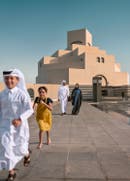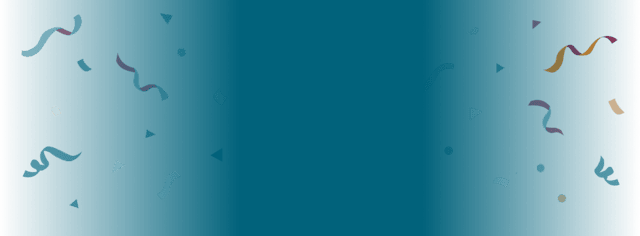The Islamic lunar calendar has several important dates, but the most festive are the two Eid holidays. After Ramadan, the month-long period of fasting comes the feasting that heralds Eid Al Fitr. About two months later, marking the end of Hajj, is Eid Al Adha. Stretching over four days, each Eid has its own historical significance and associated traditions. In general, it is a time for community – to meet family and friends, share food and give little children Eidiya money.
The meeting and greeting begins with Eid prayers, usually held very early in the morning. These are traditionally held in mosques, where the men gather without the usual call to prayer. This is followed by a brief sermon by an Imam. Mosques tend to be male-only spaces, or segregated, with women usually offering their prayers from home. Everyone wears their best attire, with men often tailoring new thobes, and women, beautiful dresses and kaftans. After a small breakfast at home, families venture out, greeting everyone with "Eid Mubarak" meaning "Blessed Eid", or "Kul 'am wa enta bi-khair." meaning "May every year find you in good health." Children, possibly most excited for the holiday, roam the neighbourhood greeting everyone and collect their "Eidiyah," chanting traditional songs and phrases as they knock on doors.
- item1
- item1
- item1
Festival of breaking the fast
Translating into the "festival of breaking the fast," Eid Al Fitr is celebrated on the first day of the 10th month in the Islamic Lunar calendar, immediately after Ramadan. Charity is of utmost importance during this holiday, with families across Qatar making donations to favoured causes.
Eid Al Fitr is a national holiday, with schools, offices and businesses closed in the mornings so families and neighbours can celebrate together. The festive air is carried throughout Qatar, with special events in malls and public spaces. Plenty of family-friendly activities and interactive exhibits pop up at this time.
Feast of the sacrifice
Eid Al Adha, which translates to "feast of the sacrifice," comes at the end of Hajj, an annual pilgrimage to Mecca, which is incumbent on Muslims who have the means to do so at least once in their lifetime. The holiday takes place on the 10th day of the final month in the Islamic Lunar calendar. Eid Al Adha follows the story of Prophet Ibrahim, who was asked to sacrifice his son as a test of faith. As narrated in the Quran, the story describes how just as Ibrahim was about to sacrifice his son, Ismail, God intervened, and a ram was taken in his place. Muslims re-enact the sacrifice, by offering an animal and distributing its meat to family, friends, and the poor.
Similar to Eid Al Fitr, morning prayers start the festivities, with families and friends gathering to celebrate over a large feast and exchanging gifts, with children receiving "Eidiyah," a small sum of cash. Many people also attend the various festivities that take place throughout Qatar at this time, with interactive shows, events and activities in malls and outdoor spaces such as Katara and Aspire Park.
Eid greetings
To offer your own greeting, try these special Eid greetings and phrases on Muslim friends:
- Eid Mubarak - Blessed Eid or Happy Eid
- Eid Saeed - Happy Eid
- Kul 'am wa enta bi-khair - May every year find you in good health
- Taqabbala Allahu minna wa minkum - May Allah accept from us, and from you.
- As-Salam-u-Alaikum - Peace be upon you
Your perfect guide to Eid in Qatar – with even more offers
Make the most of Eid 2025 in Qatar with the Visit Qatar mobile app. Discover more iftar and suhoor offers and stay updated on Ramadan events and cultural experiences – all in one place.

Things to know before travelling
-
Visas
Want to travel visa-free? Check if you qualify here.
-
Getting here
Planning your trip to Qatar? Check how to get here.
-
Travel tips
Make the most of your visit with our handy travel guide.
-
Getting around
From a dhow boat to our world-class metro, here’s how to easily explore Qatar.
Doha City Guidebook
Contact















